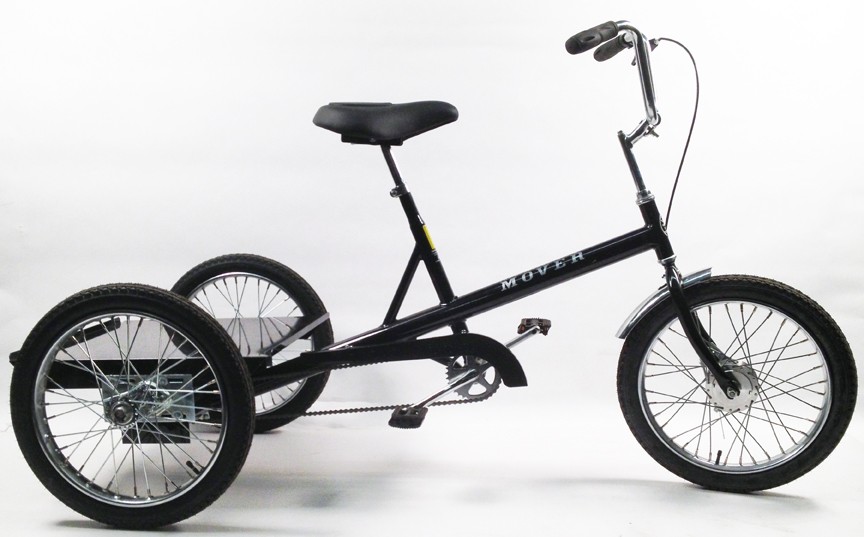What Are the Benefits of Using a Worksman Cycle Cargo Bike for Local Business?
 Local businesses operating in busy urban settings continually grapple with the frustrations of transportation logistics, from unpredictable delays to escalating costs eating away at slim profit margins. Whether navigating gridlocked streets during rush hour or circling endlessly in search of parking, these daily inefficiencies directly impact both operational success and employee morale. For many small businesses, these challenges become so routine that they've almost accepted them as unavoidable costs of city commerce. But what if there were a simpler, more efficient way to operate, one that directly addresses these persistent pain points rather than just tolerating them?
Local businesses operating in busy urban settings continually grapple with the frustrations of transportation logistics, from unpredictable delays to escalating costs eating away at slim profit margins. Whether navigating gridlocked streets during rush hour or circling endlessly in search of parking, these daily inefficiencies directly impact both operational success and employee morale. For many small businesses, these challenges become so routine that they've almost accepted them as unavoidable costs of city commerce. But what if there were a simpler, more efficient way to operate, one that directly addresses these persistent pain points rather than just tolerating them?
Worksman Cycles cargo bikes offer precisely this solution, providing businesses with tangible benefits through significant cost savings, increased operational efficiency, powerful environmental advantages, improved employee well-being, and enhanced community relationships. By leveraging a method of transport designed explicitly for urban conditions, Worksman Cycles enables businesses not merely to manage these problems but to transform their entire approach to local transportation logistics.
Significant Financial Savings for Businesses
The high costs associated with traditional vehicles create significant financial burdens, especially for small and medium-sized enterprises. Worksman Cycles cargo bikes directly address this pain by dramatically reducing upfront and ongoing operational expenses. With an estimated lifetime cost of roughly 1% of a conventional motor vehicle, Worksman cargo bikes provide immediate relief to tight budgets. For instance, businesses making daily short-distance deliveries—around 10 kilometers—can realistically save approximately $1,700 annually when considering depreciation and regular maintenance. Additionally, research indicates cargo bikes deliver parcels at nearly one-tenth the expense of van-based delivery systems, even excluding labor costs.
Fuel costs, another substantial drain on business budgets, are also virtually eliminated with Worksman cargo bikes. Typical annual fuel expenditures for delivery vans range from $750 to $1,750, while cargo bikes lower that cost to about $100, creating direct, measurable savings for the business. Moreover, Worksman bikes bypass conventional road taxes and significantly reduce insurance premiums, adding further to their economic appeal. Parking costs, a notorious and unavoidable urban expense, become practically nonexistent, freeing valuable funds previously lost to tickets or hourly parking fees.
Enhanced Operational Efficiency and Speed in Urban Environments
When urban deliveries stall, customers grow frustrated, and businesses lose opportunities. Worksman Cycles cargo bikes are purpose-built to excel precisely where traditional vehicles fail—dense city streets and narrow alleyways. Cargo bikes consistently outperform vans in urban delivery speed tests, proving nearly twice as efficient during peak traffic conditions. Because Worksman cargo bikes can easily navigate bike lanes, pathways, and certain restricted traffic zones, their delivery routes are commonly up to 30% shorter than those followed by motor vehicles. This results in more predictable arrival times, directly benefiting business logistics planning and reliability.
Parking convenience is another critical efficiency gain unique to cargo bikes. Unlike vans or trucks, which typically require time-consuming parking maneuvers and long walks to final destinations, cargo bikes can park directly at storefronts, loading docks, or even on sidewalks. Businesses can recover up to 20 minutes per trip in busy urban areas, resulting in more deliveries per day and increased productivity. This efficiency is particularly valuable in the critical last-mile delivery stage, where Worksman cargo bikes deliver directly to doorsteps, significantly increasing customer satisfaction.
Proven Environmental Sustainability and Enhanced Brand Image
Businesses increasingly understand that environmental responsibility isn't simply a moral choice but a practical necessity that resonates with today's consumers. Worksman Cycles, committed to sustainable manufacturing, directly supports this business objective by significantly reducing the carbon footprint associated with delivery operations. Compared to traditional diesel vans, Worksman cargo bikes offer a 98% reduction in greenhouse gas emissions, even providing a 96% reduction compared to electric vans. This dramatic reduction positions businesses as environmental leaders within their communities.
The positive public relations impact of choosing cargo bikes can't be overstated. Branded Worksman Cycles visibly demonstrate a business's commitment to sustainability, innovation, and local responsibility. This authentic connection creates deeper customer loyalty, differentiating the business from competitors who rely on polluting delivery vehicles. Additionally, cargo bikes contribute significantly fewer fine particulate emissions due to their lighter weight and reduced brake wear, further enhancing the environmental image of the business within its community.
Improved Employee Health, Well-being, and Productivity
Employee health and morale directly influence overall business productivity and profitability. Worksman Cycles cargo bikes encourage active transport, providing daily physical exercise that significantly boosts cardiovascular health and overall fitness among employees. Workers who regularly use cargo bikes typically meet recommended daily activity levels, resulting in measurable health benefits such as lower healthcare costs, reduced absenteeism, and greater resilience against common illnesses.
Beyond physical health, using cargo bikes also significantly improves mental well-being and job satisfaction. Regular cycling is scientifically linked to reduced stress and anxiety levels, improved sleep patterns, and increased creativity. Employees who arrive at destinations energized rather than stressed from traffic congestion are inherently more productive and better positioned to deliver positive customer interactions. This direct link between employee wellness and business performance creates a compelling argument for integrating Worksman cargo bikes into daily operations.
Strengthening Local Community Connections and Urban Quality of Life
When businesses use cargo bikes, they're actively contributing to making urban environments more pleasant, safer, and socially vibrant. Worksman cargo bikes help alleviate traffic congestion, making streets safer and more accessible to pedestrians and other cyclists. Reduced vehicle traffic directly translates into fewer accidents and injuries, particularly benefiting vulnerable groups like children and seniors.
Furthermore, local economies thrive when residents opt for walking or cycling over driving. Studies consistently show pedestrians and cyclists frequent local businesses more often than motorists, leading to stronger local commerce. Cargo bikes also facilitate more frequent interpersonal interactions among community members and businesses, creating vibrant, welcoming urban spaces and enhancing overall neighborhood cohesion. This direct community engagement positions businesses using Worksman Cycles as integral parts of their neighborhoods, improving brand perception and local loyalty.
Worksman Cycles: American Craftsmanship and Purpose-Driven Design
Worksman Cycles, proudly "Made in America," has carefully built its reputation since 1898 around a fundamental commitment to quality and practical urban mobility. Operating its main bicycle factory in Conway, South Carolina, and its food cart factory and corporate headquarters in Ozone Park, New York, the company meticulously combines domestic and imported components to ensure superior reliability and longevity of each product.
Their diverse range of cargo bike models, including the Newsboy, Newsgirl, Low-Gravity, and M2600, along with industrial tricycles like the Mover and Adaptable, are explicitly designed to withstand rigorous daily business use. Specific industrial models, such as the M2626-3CB Mover—recognized globally for heavy-duty industrial application—and the Port-O-Trike PT3CB, highlight Worksman's commitment to addressing specific business challenges through thoughtful, robust design.
With demand for Worksman Cycles at unprecedented levels, businesses choosing these bikes align themselves not just with sustainability but also with American manufacturing excellence and community-centric values. This strategic choice provides immediate operational benefits while establishing businesses as forward-thinking leaders genuinely invested in their local environment and economy.







